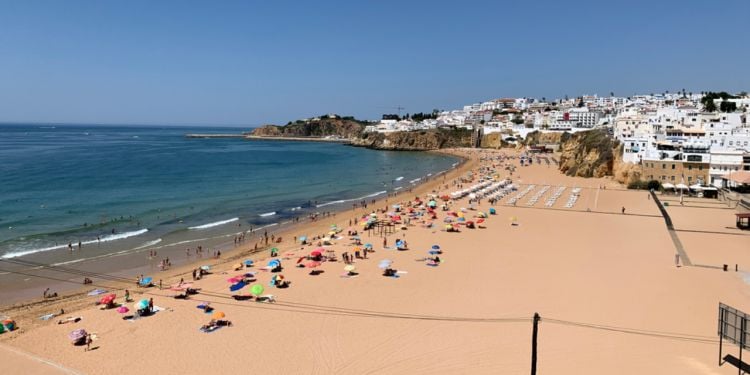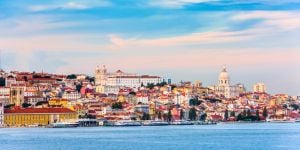
Now that Portugal has reopened its borders, foreign travellers are allowed to enter the country for essential reasons such as work, studies or family reunification. However, they have to meet certain conditions and fill in specific formalities upon arrival. If you're planning to relocate to Portugal after the COVID-19 crisis, learn about the changes relating to entry and visa requirements, work, real estate, lifestyle, etc.
What are the current regulations for entering Portugal?
Citizens of the European Union and the Schengen area, as well as foreigners coming from Australia, Canada, China, South Korea, Georgia, Japan, Morocco, New Zealand, Rwanda, Thailand, Tunisia and Uruguay, are allowed to enter Portugal for essential reasons such as work, study, family reunification, or for health or humanitarian reasons. They do not have to undergo a COVID-19 test unless they are planning to travel to the archipelagos of Madeira or the Azores. In contrast, all other travellers are required to undergo a COVID-19 test within 72 hours of their departure and provide the results upon arrival in Portugal. If they haven't taken the test before their departure, they will have to do it upon arrival, at their own expense. In case of refusal, they will not be allowed on Portuguese territory. Note that temperature checks are also conducted at the airport. Find out more on the Airports of Portugal website. Additionally, travellers have to fill in the health form provided by their airline for contact tracing. Those with COVID-19 symptoms are required to contact the health services (SNS) by calling 808 24 24 24. It's also worth noting that there's no quarantine requirement in Portugal. However, self-isolation at home for 14 days is recommended. Find out more here and on Portugal's official communication portal.
Have there been any visa changes recently?
Since the start of the COVID-19 crisis, most visa procedures in Portugal have been simplified. Thus, you don't have to visit the Aliens and Borders Service (SEF). Formalities, including the renewal of residence permits, can be filled online or by post, for one year. Once you have paid the fees, you will receive a reply at your tax address. Note that minors are exempt from fees. All visas and residence permits that expired after February 24, 2020 remain valid until October 30, 2020, provided that their holders have proof of their application for renewal. Regarding the Golden Visa, the proposed changes to prohibit investors from acquiring real estate in the central regions of Lisbon and Porto are suspended until further notice. Find out more on the SEF website.
Is it easy to find work in Portugal following the crisis?
The COVID-19 crisis had a considerable impact on the Portuguese labour market, as is the case of most countries in Europe and elsewhere. Indeed, more than 800,000 workers are expected to be unemployed by the year, which should bring the unemployment rate from 10.1% to 11.7%. Note that the active population accounts for some 5.3 million people. Add to that the wage cuts of over 1.5 million employees. According to the Ministry of Employment, nearly 32,000 local small and micro enterprises are planning to reduce their staff of 552,000 overall. Tourism, hospitality, catering, services, the manufacturing industry, as well as the auto repair industry are the most affected sectors, while Lisbon, the Tagus Valley and its surrounding areas, and Algarve, are the most affected areas -- which explains the rising unemployment rate. Every day, more than 3,000 people are registering at the labour office. Since March, the number of job seekers has therefore increased, so finding a job in Portugal as an expat, after the COVID-19 crisis, is definitely going to be a hard task.
How has the Portuguese healthcare system performed during the crisis?
With 55,597 COVID-19 cases and 1,796 deaths, Portugal has fared better than many European countries. Moreover, the government has built up a strong strategy aiming at preventing a second wave. You are perhaps aware that Portugal has a very developed and reliable health system, with 107 public hospitals, including 6 military and prison hospitals, as well as 3 hospitals resulting from a Public-Private partnership. According to the Ministry of Health, the country had 528 adult beds and 59 pediatric bed in ICU in April. The capacity of hospitals was also boosted in recent months, with a 66% increase in the number of adult ICU beds. The country currently has 1,151 ventilators, of which 388 were donated while 156 were loaned. Besides, the National Institute of Health, the military laboratory, 38 laboratories attached to public hospitals, 22 university laboratories, as well as 27 groups of private laboratories have been designated for analysis. Following a shortage of protective equipment at the start of the crisis, Portugal now has a stock of more than 26.4 million surgical masks, 930,000 COVID-19 tests and 857,000 extraction kits. Even though private hospitals and clinics are modern and well equipped, most of the COVID-19 cases were treated by public hospitals. Community health centres have been set up to limit the number of people requiring health care services at hospitals. COVID-19 tests can, therefore, be done at a hospital or private laboratory, or in drive-through screening centres. Patients with very mild symptoms are sent home for isolation and follow-up, while those with more severe symptoms are sent to emergency units. TRACE-COVID is an online platform that has been set up for the follow-up of patients who are recovering at home and for contact-tracing. Psychological services are also being provided to those who have been suffering from isolation since the lockdown, including children. Some sixty psychologists are available 24/7. A number of initiatives have also been implemented to support vulnerable people.
Has anything changed regarding universities and schools?
All schools in Portugal, including nurseries and nurseries, have reopened. The regular cleaning of classrooms, social distancing, temperature checks and rescheduling of classes are some of the measures taken to protect the students. Regarding higher education in Portugal, the new academic year also started in August 2020. Arrangements have been made to ensure both distance and face-to-face learning at university and polytechnic institutions.
How is the real estate market following the crisis?
The COVID-19 crisis had a mixed impact on the Portuguese real estate market. In general, there was a 12.8% price rise compared to 2019, according to a study carried out by Imovirtual. The average price of a house went from 318,808 euros to 359,479 euros. However, the property market is rather resilient, with slight price fluctuations from one month to another, varying by city and district. Lisbon, the capital, and Faro, in the Algarve, remain the most expensive cities, while Beja and Castelo Branco are the cheapest. If you wish to buy a property in Lisbon or in Faro, count on average 573,021 euros and 454,030 euros respectively. Between May and April 2020, there was a slight price drop of around 0.8% across the country. You are perhaps aware that Portugal is one of the world's top destinations for property investment, taking into account the large supply. So if you have always dreamed of buying a property in Portugal, now might be the right time to do so. Rents have also increased in several cities. For example, the average monthly rent is 1,595 euros in Lisbon and 1,156 euros in Porto. In Braga, which is a less popular and relatively more affordable city, count 763 euros on average.
Has the cost of living in Portugal changed because of the crisis?
With its low cost of living, Portugal is one of the world's top expat destinations. Indeed, living in Portugal is 22% cheaper than in France and 28.7% cheaper compared to the USA. However, food prices have been rising since the onset of the crisis, as in most countries. Add to this the massive layoffs in various sectors and salary cuts.
How about lifestyle? Have there been major changes in habits following the sanitary crisis?
The lifestyle in Portugal changed significantly with the lockdown. The Portuguese had to adapt and integrate the new norm to their own living style. Social distancing, the wearing of masks and hand sanitising are required in all places, including supermarkets, shops and businesses, public transport, etc. For example, public transport is currently operating at two-thirds of its normal capacity. Taxis are also required to comply with government recommendations. For example, passengers are not allowed in the front seat. Regarding cars and other private vehicles, a maximum of 5 people provided they all live under the same roof. Regarding public and private gatherings, a maximum of 20 persons are allowed, except in Lisbon where only 10 persons are allowed. Pastry shops and cafes close around 8 pm in Lisbon but at 1 am in the rest of the country. All the restaurants, as well as pubs and nightclubs also close at 1 am, and 8 pm in the capital. Outdoor events, as well as religious ceremonies, including weddings, are allowed with a limited and controlled number of persons.
We do our best to provide accurate and up to date information. However, if you have noticed any inaccuracies in this article, please let us know in the comments section below.











